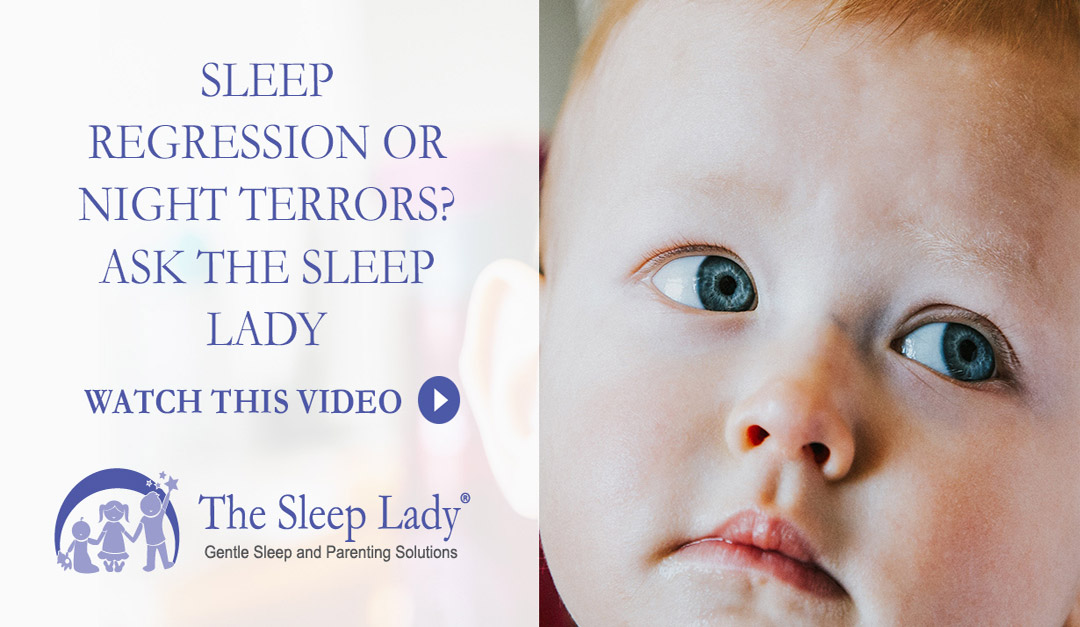Hi. I’m Kim West, the Sleep Lady. And in this video blog, I’m going to answer Maria’s question about whether her baby is experiencing sleep regression or night terrors. Here’s what she e-mailed in:
“My baby is 16 months old and has been sleeping through the night almost since we brought her home from the hospital.”
WOW! Good job!
“She takes one nap a day at around noon that usually lasts for a couple of hours. Usually from 12 to 2. We usually put her to bed around 9:00pm and she falls asleep right away without a problem.
“A couple of weeks ago, she started waking every night at around 2:30 or 3:00am and nothing seems to sooth her. We change her diapers, we sing to her, we tried to feed her. We even let her cry for a while regardless of the complaints from the neighbourhood and nothing seems to work. The only solution has been to bring her to bed with us and even then she’ll wake up crying. I’ve noticed that when this happens, she comes very close to me and hugs me very tight which made me think she might be suffering from night terrors.
“I’ve done everything to relax her as much as possible. I don’t let her watch any TV, just in case that’s the problem and I’ve tried giving her chamomile tea with her milk to relax her. I’ve even switched from regular milk to soy milk to reduce the gases she gets from lactose. I put Orajel in her gums just in case her teeth were bothering her. But still nothing works. I’ve read a lot about sleep regressions and apparently, it’s very common.”
You’re correct. 16 months is a common month for a sleep regression.
“I don’t know what else to do. I want her to get used to our bed but at 3:00 am, I don’t care about anything. Do you have any suggestions that could help us? Maria.”
Sleep Regressions or Night Terrors
Okay, Maria. I’m really glad that you wrote in. You brought up a lot of great points. Yes, this is a common age for sleep regressions that are usually related to a developmental milestone. I have a whole series of articles on my blog about sleep regressions that you may find helpful. You mentioned rather quickly that you are giving her milk. I’m not sure whether she’s having milk before bed and if that’s becoming a problem, or whether bedtime may be a problem.
I also don’t know whether bedtime’s going well because she’s so tired. The bedtime’s really late (9:00pm), which means that she’s been awake for 7 hours, so she just goes right to sleep. This may also be causing the middle of the night wakening. Or perhaps she’s getting too drowsy at bedtime with the bottle.
RELATED: Drowsy But Awake — The Cornerstone of Successful Sleep Training
Wakefulness Windows
If you look at her 12 to 2 nap, then 2 to 9 is a 7-hour wakeful window. That’s almost double what her wakefulness window should be. Anywhere between 4 and 4 ½ hours at her age is the maximum recommended wakefulness window, so I think you’re going to have to move her bedtime earlier.
Typical night terror occurs within the first two hours of sleep. Have I’ve seen it occur on other times over the years? Absolutely. It could be that she is having night terrors, but I don’t think that’s it. The most common cause of a night terror is sleep deprivation due to too late of a bedtime. Either way, I think you should move her bed time earlier. Usually, kids this age are going to sleep at around at 7:00 p.m., which even then would be a 5-hour window. You will have to see how she is doing because if she sleeps from 7 to 6:30 or 7, she may be okay with that slightly lengthened wakeful window.
Earlier Bedtime
I would start by moving her bed time earlier. Watch those wakefulness windows. Pay attention to how she’s acting right after dinner. What’s happening at 6:30? Get her upstairs, have a soothing bedtime routine, hold the shade down, read some books, and set the tone. Many times you’ll see your child rubbing her eyes around 6:30 or 7 pm. A lot of the time, we parents don’t notice that small little indicator that our toddler is sleepy. Lots of things are going on at home — everybody’s home, the TV’s on, there are lots of conversations and bright lights. The body does not secrete hormones to slow down and go to sleep because it’s not getting the proper signal.
By providing those signals earlier and making sure that you’re not missing her bedtime window, she can learn the skills to put herself to sleep. This will help her to get herself back to sleep or eventually get rid of night terrors. If that’s what’s going on, an earlier bedtime will help reduce night time terrors.




